“In an unfinished church in the shadow of the Olympic village in Rio de Janeiro, a small group of Brazilians held hands and gave thanks for a victory in a long battle against eviction from their homes. With scaffolding covering a mural behind the altar, a priest led a dozen residents of the once-thriving Vila Autodromo fishing community in a prayer for the aid workers who had supported their struggle to remain. For most, the victory is bittersweet. Their quiet community among the trees, once home to 600 families, has been bulldozed to make way for a parking lot and access roads to the Olympic park. In its place, two neat rows of identical whitewashed houses stare at each other across a newly tarred road, home to the 20 families who resisted pressure from authorities to accept compensation or relocation to nearby tower blocks. “It was a very difficult fight. Above all, it was God who helped us”, said Denise Costa dos Santos, leaving the church. Dos Santos has no kind words for Rio Mayor Eduardo Paes, whose administration relocated tens of thousands of people in the buildup to the first Olympics to be hosted in South America, which open on Friday.
Though it lacked regular sanitation, the community of Vila Autodromo was free of the drug trafficking and violence that plagues many of the poor neighbourhoods nearer the centre of Rio. One-fifth of the city's 6 million people live in slums. Most of the $12 billion price tag for Rio's Olympics was funded by private investment, in return for development rights for the land and property. The nearby Olympic Village will be sold off as luxury housing after the Games. Creeping gentrification had turned the western Rio neighbourhood of Barra, where the Games will be held, into an expanse of shopping malls, luxury condominiums and highways. After Rio won the Games in 2009, families in Vila Autodromo were told that their homes were on land needed for access roads, parking or landscaping of the border of the Jacarepagua lagoon next to the Olympic stadiums. They were offered new public housing a couple of miles away or financial compensation. The deployment of hundreds of municipal guards to evict the residents of Vila Autodromo this year generated criticism of Rio's heavy-handed tactics in preparing for the Games”. – Daniel Flynn via Reuters
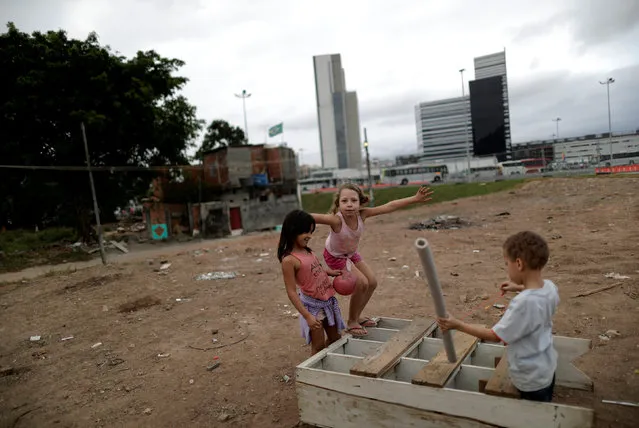
Children play in the Vila Autodromo slum, next to the 2016 Rio Olympic Park, in Rio de Janeiro, Brazil, July 29, 2016. (Photo by Ricardo Moraes/Reuters)
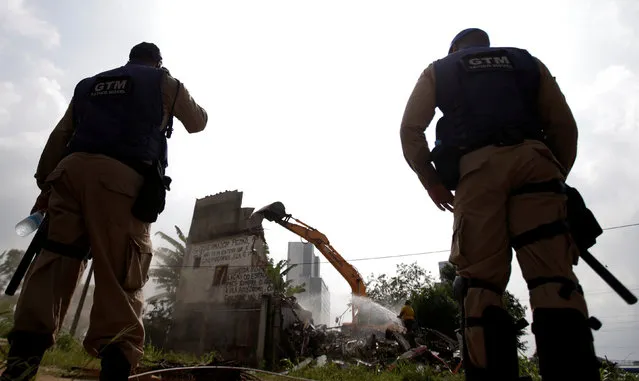
Municipal guards observe the demolition of a house in the Vila Autodromo community, surrounded by construction work for the Rio 2016 Olympic Park, in Rio de Janeiro, Brazil, March 8, 2016. (Photo by Ricardo Moraes/Reuters)
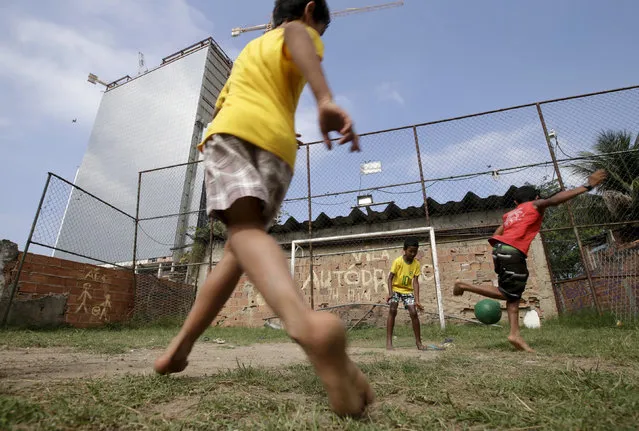
Children play soccer in the Vila Autodromo slum in Rio de Janeiro, Brazil, July 28, 2015. (Photo by Ricardo Moraes/Reuters)
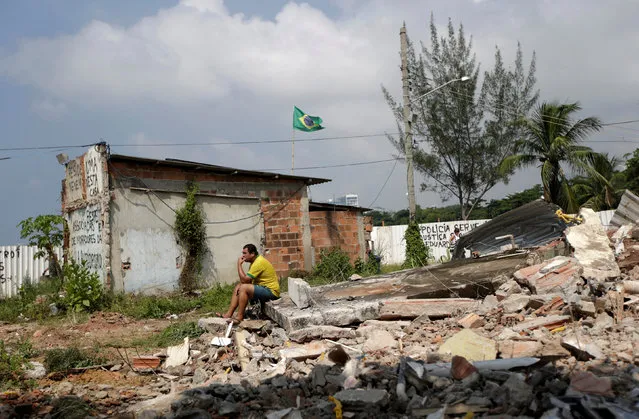
Marcio Moza sits in the debris of his just-demolished house in the Vila Autodromo community surrounded by construction work for the Rio 2016 Olympic Park, in Rio de Janeiro, Brazil, March 8, 2016. (Photo by Ricardo Moraes/Reuters)
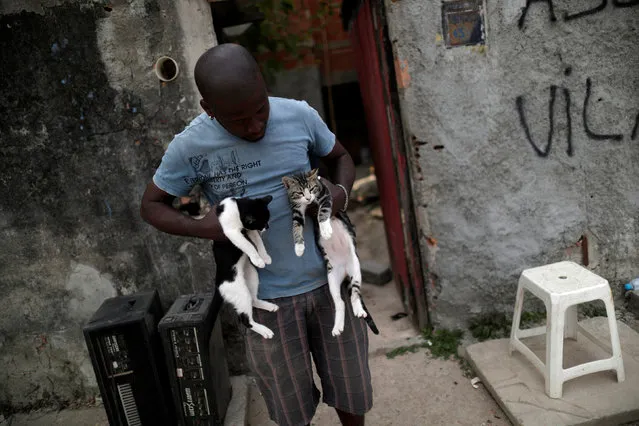
Wanderson Augusto, who has lived in Vila Autodromo slum for 20 years, holds his cats before his house gets demolished, after moving to one of the twenty houses built for the residents who refused to leave the community, in Rio de Janeiro, Brazil, August 2, 2016. (Photo by Ricardo Moraes/Reuters)
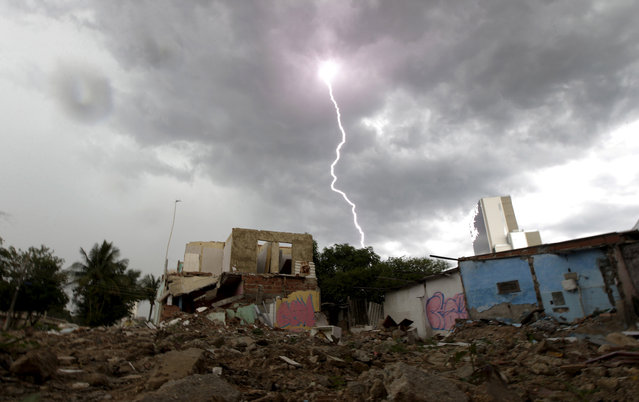
Partially demolished houses stand in the Vila Autodromo slum with the Rio 2016 Olympic Park in the background in Rio de Janeiro, Brazil, February 25, 2016. (Photo by Ricardo Moraes/Reuters)
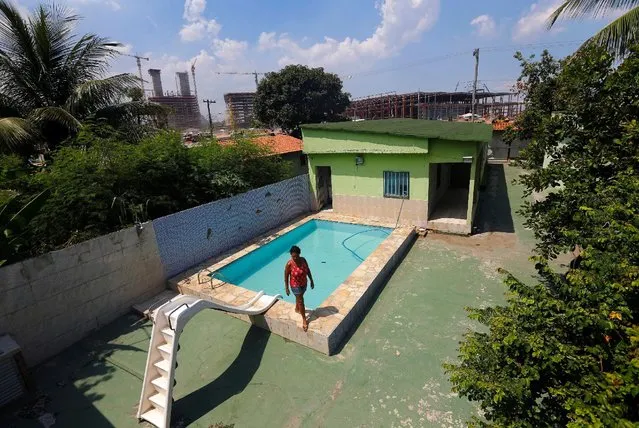
Marcia Lemos, 57, walks by a pool in her house, with cranes and construction work for the Rio 2016 Olympic Park seen in the background, at the Vila Autodromo slum in Rio de Janeiro, Brazil, January 28, 2015. (Photo by Ricardo Moraes/Reuters)
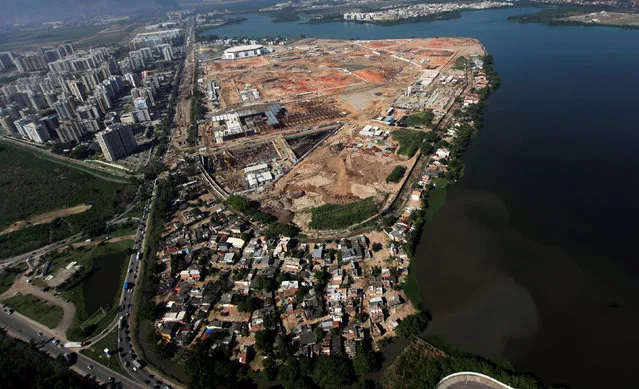
An aerial view shows the Vila Autodromo slum (foreground) next to the 2016 Rio Olympic Park construction site in Rio de Janeiro, Brazil, June 27, 2014. Picture taken June 27, 2014. (Photo by Ricardo Moraes/Reuters)
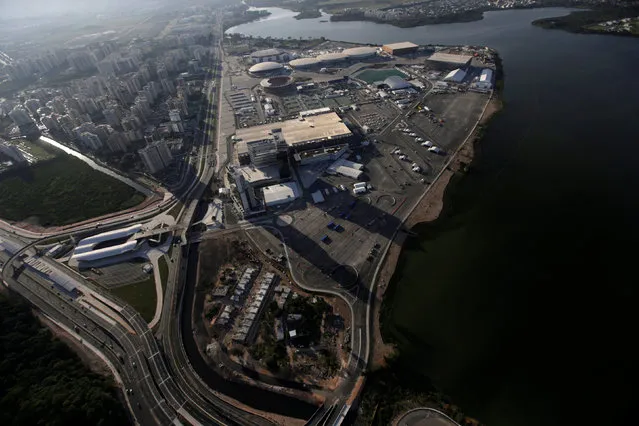
An aerial view shows twenty houses (foreground) built for residents who refused to leave the Vila Autodromo community, and the 2016 Rio Olympic Park in Rio de Janeiro, Brazil, July 16, 2016. (Photo by Ricardo Moraes/Reuters)
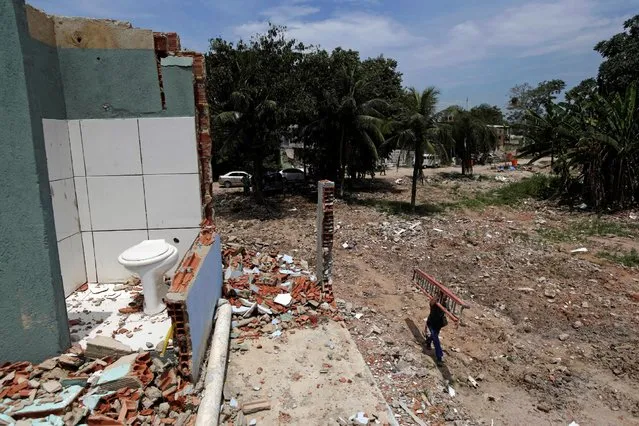
Partially demolished houses are seen in the Vila Autodromo slum in Rio de Janeiro, Brazil, February 25, 2016. (Photo by Ricardo Moraes/Reuters)
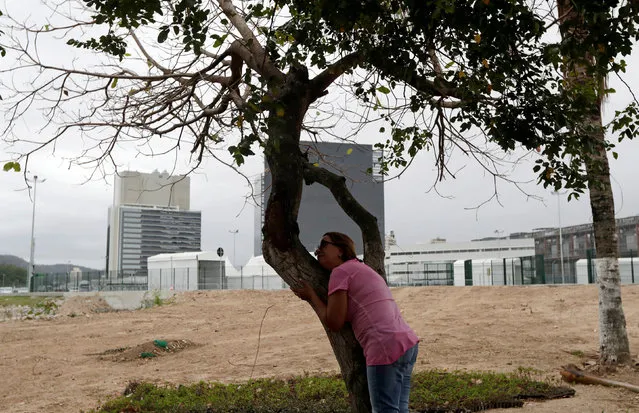
Marcia Lemos, 58, who has lived in the Vila Autodromo slum for 13 years, hugs a tree at the site of her former house during a visit to the community in Rio de Janeiro, Brazil, July 28, 2016. Picture taken July 28, 2016. (Photo by Ricardo Moraes/Reuters)
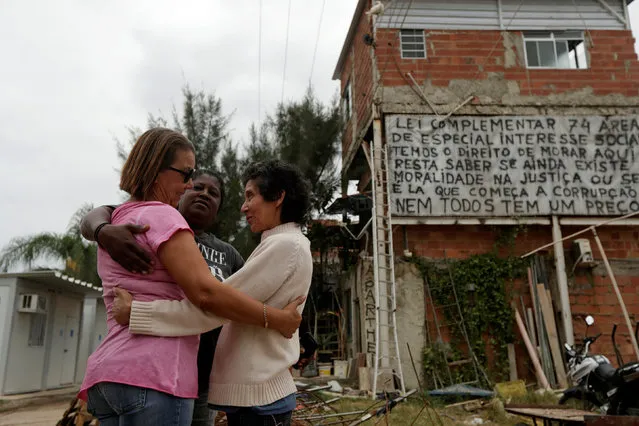
Former resident of the Vila Autodromo slum Marcia Lemos (L) is greeted by Sandra Regina (C) and Maria da Penha during a visit to the community in Rio de Janeiro, Brazil, July 28, 2016. Picture taken July 28, 2016. (Photo by Ricardo Moraes/Reuters)
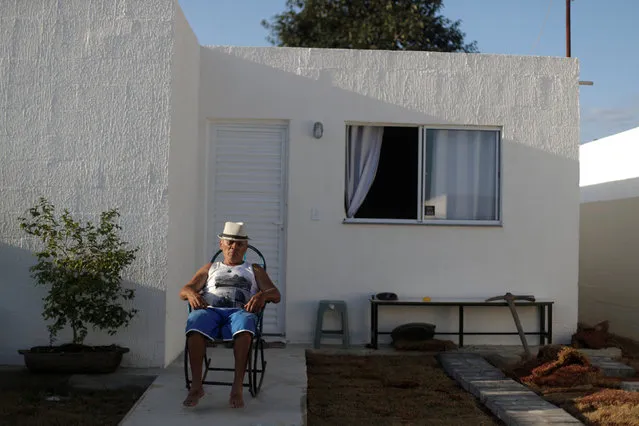
Jose Gomes, 65, who has lived in the Vila Autodromo slum for 35 years, poses outside his new house which is one of the twenty houses built for the residents who refused to leave the community, in Rio de Janeiro, Brazil July 31, 2016. (Photo by Ricardo Moraes/Reuters)
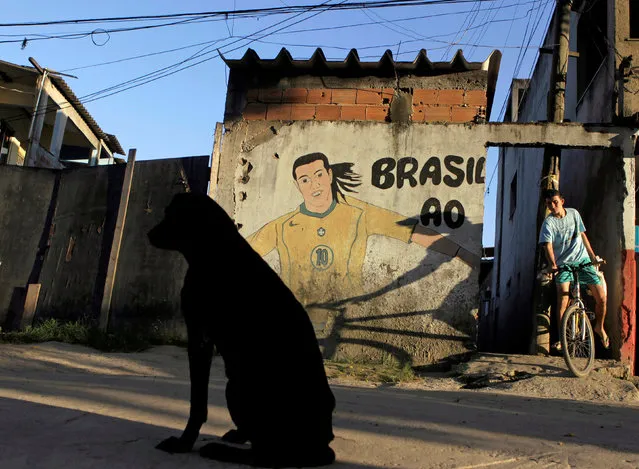
A man rides a bicycle next to a wall with graffiti depicting Brazilian soccer player Ronaldinho in Vila Autodromo slum in Rio de Janeiro, Brazil April 19, 2012. (Photo by Ricardo Moraes/Reuters)
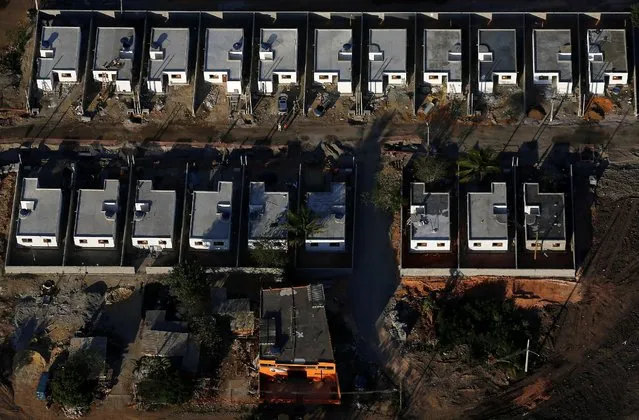
An aerial view shows twenty houses built for the residents who refused to leave the Vila Autodromo community in Rio de Janeiro, Brazil, July 16, 2016. (Photo by Ricardo Moraes/Reuters)
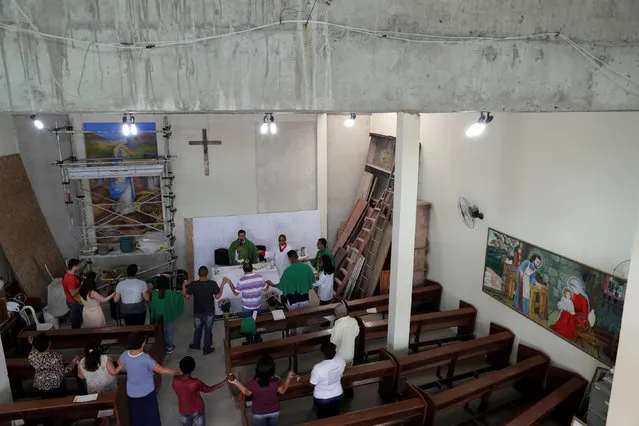
Residents of the Vila Autodromo slum attend a mass at a Catholic church, the only original building that will not be demolished in the slum, in Rio de Janeiro, Brazil, July 31, 2016. Picture taken July 31, 2016. (Photo by Ricardo Moraes/Reuters)
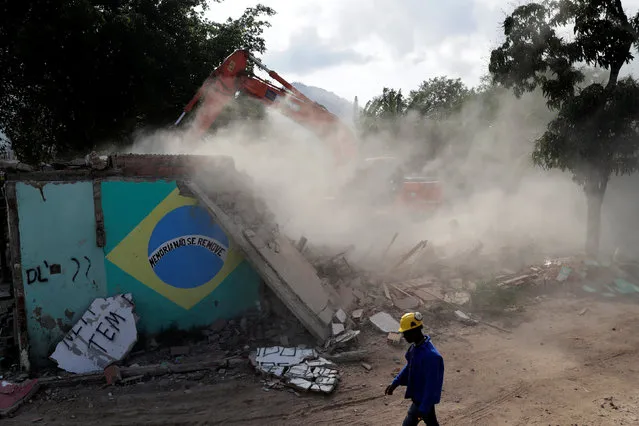
The house of Carlos Augusto and Sandra Regina (not pictured) who have lived in Vila Autodromo slum for 20 years with their children, is demolished after the family moved to one of the twenty houses built for the residents who refused to leave the community, in Rio de Janeiro, Brazil, August 2, 2016. (Photo by Ricardo Moraes/Reuters)
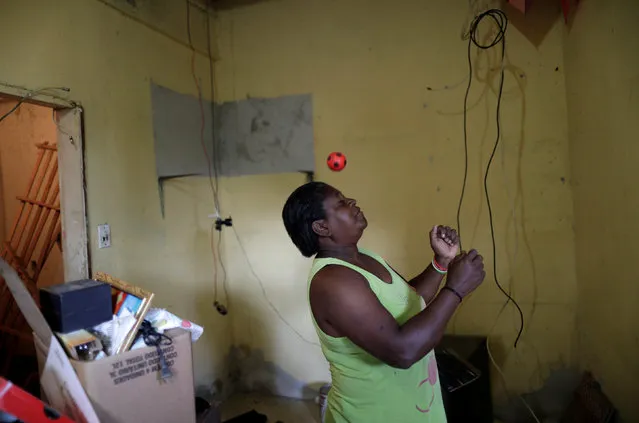
Sandra Regina, 53, who has lived in the Vila Autodromo slum for 20 years with her children, plays with a ball as the family moves to one of the twenty houses built for the residents who refused to leave the community, in Rio de Janeiro, Brazil, August 1, 2016. (Photo by Ricardo Moraes/Reuters)
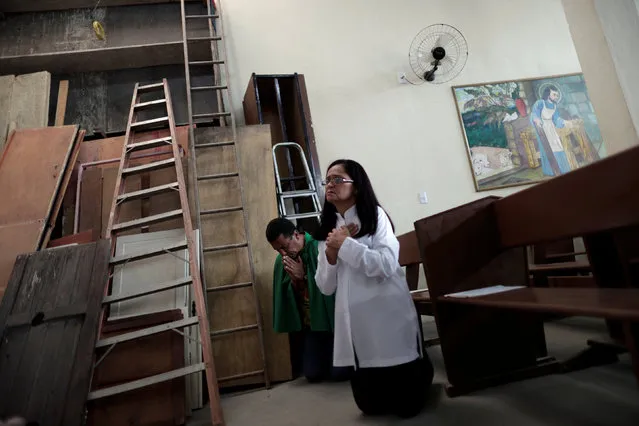
Luis Claudio, who has lived in the Vila Autodromo slum for 23 years, attends a mass at a Catholic church, the only original building that will not be demolished in the community, in Rio de Janeiro, Brazil, July 31, 2016. (Photo by Ricardo Moraes/Reuters)
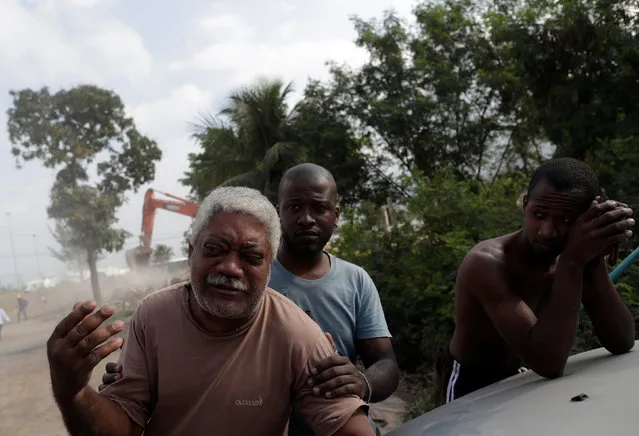
Carlos Augusto (L), who has lived in the Vila Autodromo slum for 20 years, reacts as his house is being demolished after he moved to one of the twenty houses built for the residents who refused to leave the community, in Rio de Janeiro, Brazil, August 2, 2016. (Photo by Ricardo Moraes/Reuters)
Though it lacked regular sanitation, the community of Vila Autodromo was free of the drug trafficking and violence that plagues many of the poor neighbourhoods nearer the centre of Rio. One-fifth of the city's 6 million people live in slums. Most of the $12 billion price tag for Rio's Olympics was funded by private investment, in return for development rights for the land and property. The nearby Olympic Village will be sold off as luxury housing after the Games. Creeping gentrification had turned the western Rio neighbourhood of Barra, where the Games will be held, into an expanse of shopping malls, luxury condominiums and highways. After Rio won the Games in 2009, families in Vila Autodromo were told that their homes were on land needed for access roads, parking or landscaping of the border of the Jacarepagua lagoon next to the Olympic stadiums. They were offered new public housing a couple of miles away or financial compensation. The deployment of hundreds of municipal guards to evict the residents of Vila Autodromo this year generated criticism of Rio's heavy-handed tactics in preparing for the Games”. – Daniel Flynn via Reuters

Children play in the Vila Autodromo slum, next to the 2016 Rio Olympic Park, in Rio de Janeiro, Brazil, July 29, 2016. (Photo by Ricardo Moraes/Reuters)

Municipal guards observe the demolition of a house in the Vila Autodromo community, surrounded by construction work for the Rio 2016 Olympic Park, in Rio de Janeiro, Brazil, March 8, 2016. (Photo by Ricardo Moraes/Reuters)

Children play soccer in the Vila Autodromo slum in Rio de Janeiro, Brazil, July 28, 2015. (Photo by Ricardo Moraes/Reuters)

Marcio Moza sits in the debris of his just-demolished house in the Vila Autodromo community surrounded by construction work for the Rio 2016 Olympic Park, in Rio de Janeiro, Brazil, March 8, 2016. (Photo by Ricardo Moraes/Reuters)

Wanderson Augusto, who has lived in Vila Autodromo slum for 20 years, holds his cats before his house gets demolished, after moving to one of the twenty houses built for the residents who refused to leave the community, in Rio de Janeiro, Brazil, August 2, 2016. (Photo by Ricardo Moraes/Reuters)

Partially demolished houses stand in the Vila Autodromo slum with the Rio 2016 Olympic Park in the background in Rio de Janeiro, Brazil, February 25, 2016. (Photo by Ricardo Moraes/Reuters)

Marcia Lemos, 57, walks by a pool in her house, with cranes and construction work for the Rio 2016 Olympic Park seen in the background, at the Vila Autodromo slum in Rio de Janeiro, Brazil, January 28, 2015. (Photo by Ricardo Moraes/Reuters)

An aerial view shows the Vila Autodromo slum (foreground) next to the 2016 Rio Olympic Park construction site in Rio de Janeiro, Brazil, June 27, 2014. Picture taken June 27, 2014. (Photo by Ricardo Moraes/Reuters)

An aerial view shows twenty houses (foreground) built for residents who refused to leave the Vila Autodromo community, and the 2016 Rio Olympic Park in Rio de Janeiro, Brazil, July 16, 2016. (Photo by Ricardo Moraes/Reuters)

Partially demolished houses are seen in the Vila Autodromo slum in Rio de Janeiro, Brazil, February 25, 2016. (Photo by Ricardo Moraes/Reuters)

Marcia Lemos, 58, who has lived in the Vila Autodromo slum for 13 years, hugs a tree at the site of her former house during a visit to the community in Rio de Janeiro, Brazil, July 28, 2016. Picture taken July 28, 2016. (Photo by Ricardo Moraes/Reuters)

Former resident of the Vila Autodromo slum Marcia Lemos (L) is greeted by Sandra Regina (C) and Maria da Penha during a visit to the community in Rio de Janeiro, Brazil, July 28, 2016. Picture taken July 28, 2016. (Photo by Ricardo Moraes/Reuters)

Jose Gomes, 65, who has lived in the Vila Autodromo slum for 35 years, poses outside his new house which is one of the twenty houses built for the residents who refused to leave the community, in Rio de Janeiro, Brazil July 31, 2016. (Photo by Ricardo Moraes/Reuters)

A man rides a bicycle next to a wall with graffiti depicting Brazilian soccer player Ronaldinho in Vila Autodromo slum in Rio de Janeiro, Brazil April 19, 2012. (Photo by Ricardo Moraes/Reuters)

An aerial view shows twenty houses built for the residents who refused to leave the Vila Autodromo community in Rio de Janeiro, Brazil, July 16, 2016. (Photo by Ricardo Moraes/Reuters)

Residents of the Vila Autodromo slum attend a mass at a Catholic church, the only original building that will not be demolished in the slum, in Rio de Janeiro, Brazil, July 31, 2016. Picture taken July 31, 2016. (Photo by Ricardo Moraes/Reuters)

The house of Carlos Augusto and Sandra Regina (not pictured) who have lived in Vila Autodromo slum for 20 years with their children, is demolished after the family moved to one of the twenty houses built for the residents who refused to leave the community, in Rio de Janeiro, Brazil, August 2, 2016. (Photo by Ricardo Moraes/Reuters)

Sandra Regina, 53, who has lived in the Vila Autodromo slum for 20 years with her children, plays with a ball as the family moves to one of the twenty houses built for the residents who refused to leave the community, in Rio de Janeiro, Brazil, August 1, 2016. (Photo by Ricardo Moraes/Reuters)

Luis Claudio, who has lived in the Vila Autodromo slum for 23 years, attends a mass at a Catholic church, the only original building that will not be demolished in the community, in Rio de Janeiro, Brazil, July 31, 2016. (Photo by Ricardo Moraes/Reuters)

Carlos Augusto (L), who has lived in the Vila Autodromo slum for 20 years, reacts as his house is being demolished after he moved to one of the twenty houses built for the residents who refused to leave the community, in Rio de Janeiro, Brazil, August 2, 2016. (Photo by Ricardo Moraes/Reuters)
05 Aug 2016 13:07:00,
post received
0 comments
